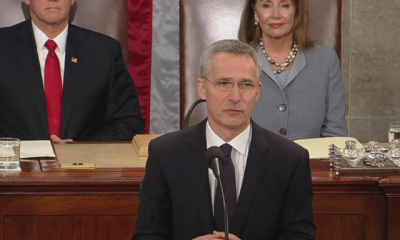NATO Summit: The American Empire Deploys Troops for Battle

All Global Research articles can be read in 51 languages by activating the “Translate Website” drop down menu on the top banner of our home page (Desktop version).
Visit and follow us on Instagram at @crg_globalresearch.
***
The NATO Summit took place yesterday at the headquarters in Brussels: the North Atlantic Council at the highest level of State and Government Leaders. It was formally chaired by Secretary-General Jens Stoltenberg, de facto by the President of the United States Joseph Biden, who came to Europe to call to arms his Allies in the global conflict against Russia and China. The NATO Summit was preceded and prepared by two political initiatives that saw Biden as the protagonist – the signing of the New Atlantic Charter, and the G7 – and they will be followed by President Biden’s meeting with the President of the Russian Federation Vladimir Putin on June 16 in Geneva. The meeting outcome is heralded by Biden’s refusal to hold the usual final press conference with Putin.
The New Atlantic Charter was signed on June 10 in London by the President of the United States and the British Prime Minister Boris Johnson. It is a significant political document to which our media have given little importance. The historic Atlantic Charter – signed by the US President Roosevelt and British Prime Minister Churchill in August 1941, two months after Nazi Germany had invaded the Soviet Union – enunciated the values on which the future world order would be based with “Great democracies” warranty: above all the renunciation of the use of force, the self-determination of peoples, and their equal rights in access to resources. Later history has shown how these values have been applied. Now the “revitalized” Atlantic Charter reaffirms its commitment to “defend our democratic values against those who try to undermine them“. To this end, the US and Great Britain assure their Allies that they will always be able to count on “our nuclear deterrents” and that “NATO will remain a nuclear alliance”.
The G7 Summit, held in Cornwall from June 11 to June 13, ordered Russia to “stop its destabilising behaviour and malign activities, including its interference in other countries’ democratic systems“, and it accused China of “non-market policies and practices which undermine the fair and transparent operation of the global economy“. With these and other accusations (formulated in Washington’s own words), the European powers of the G7 – Great Britain, Germany, France and Italy, which are at the same time the major European NATO powers – aligned with the United States before the NATO Summit.
The NATO Summit opened with the statement that “our relationship with Russia is at its lowest point since the end of the Cold War. This is due to Russia’s aggressive actions” and that “China’s military build-up, growing influence and coercive behaviour also poses some challenges to our security”. A veritable declaration of war that, by turning reality upside down, leaves no room for negotiations to ease the tension.
The Summit opened a “new chapter” in the history of the Alliance, based on the “NATO 2030” Agenda. The “Transatlantic link” between the United States and Europe is strengthened on all levels – political, military, economic, technological, space, and others – with a strategy that spans on a global scale from North and South America to Europe, from Asia to Africa. In this context, the US will soon deploy new nuclear bombs and new medium-range nuclear missiles in Europe against Russia and in Asia against China. Hence the decision of the Summit to further increase military spending: the United States, whose expenditure amounts to almost 70% of the 30 NATO countries’ total, is pushing the European Allies to increase it. Since 2015, Italy has increased its annual spending by 10 billion, bringing it to about 30 billion dollars in 2021 (according to NATO data), the fifth nation in order of magnitude among the 30 NATO countries, but the level to reach is more than 40 billion dollars annually.
At the same time, the role of the North Atlantic Council is strengthened. It is the political body of the Alliance, which decides not by the majority but always “unanimously and by mutual agreement” according to NATO rules, that is, in agreement with what is decided in Washington. The strengthened role of the North Atlantic Council entails a further weakening of the European Parliaments, in particular the Italian Parliament that is already deprived of real decision-making powers on foreign and military policy, given that 21 out of the 27 EU Countries belong to NATO.
However, not all European countries are on the same level: Great Britain, France and Germany negotiate with the United States on the basis of their own interests, while Italy agrees to Washington’s decisions against its own interests. The economic contrasts (for example the contrast on the North Stream pipeline between Germany and the USA) take a back seat to the superior common interest: to ensure that the West maintains its dominance in a world where new State and social subjects emerge or re-emerge.
*
Note to readers: Please click the share buttons above or below. Follow us on Instagram, @crg_globalresearch. Forward this article to your email lists. Crosspost on your blog site, internet forums. etc.
This article was originally published in Italian on Il Manifesto.
Manlio Dinucci, award winning author, geopolitical analyst and geographer, Pisa, Italy. He is a Research Associate of the Centre for Research on Globalization.

